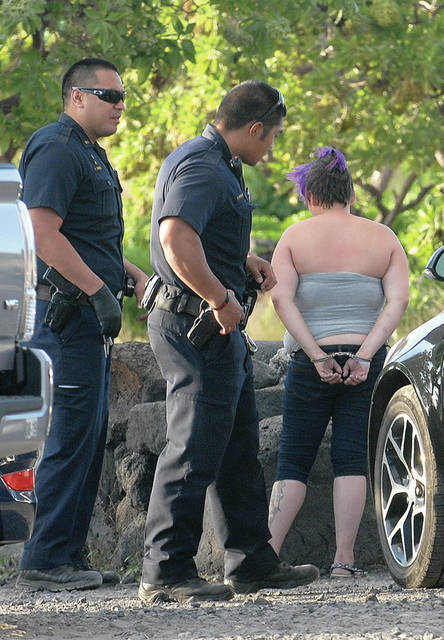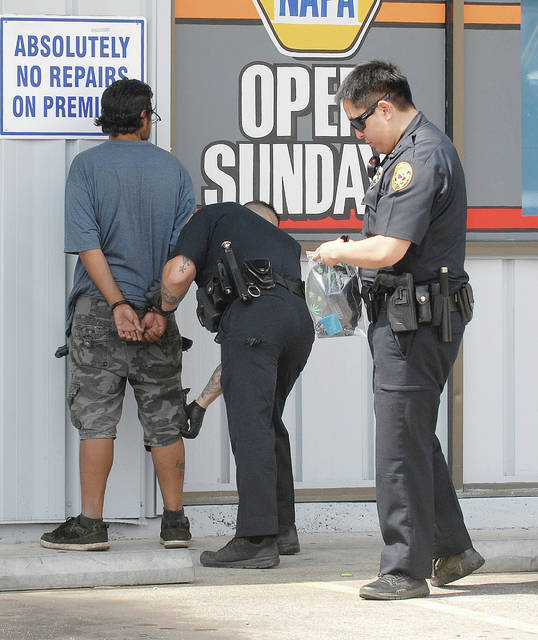Debate circles state’s bail system that ACLU report calls financially unequal

Crystal Young of Alaska is taken into custody after a crash at Old Kona Airport Park sent one man to the hospital in December. (Laura Ruminski/West Hawaii Today)

Hawaii County Police officers make an arrest in this file photo. (Laura Ruminski/West Hawaii Today)
KAILUA-KONA — The state’s bail system is in the middle of a debate over civil rights violations and community safety.
KAILUA-KONA — The state’s bail system is in the middle of a debate over civil rights violations and community safety.
This week, a House committee in the state Legislature decided to defer two bills to the next legislative session that look into the state’s bail system. The bills push for Hawaii courts to order any person charged with a criminal offense to be released on personal recognizance or on the execution of an unsecured bond, unless the person is unlikely to appear for trial. It would also require the Judiciary to establish statewide court appearance reminder system.
In the midst of the presentation of bail bills aimed at revamping the entire system, the American Civil Liberties Union released a report that showed current bail practices prioritize wealth of the accused over risk to the community. The ACLU conducted the bail study over a six-month period.
According to the report, money is required to bail out of jail 88 percent of the time statewide. More than 50 percent of those accused do not post bail, “likely because they cannot afford it.”
Despite the bills being deferred, ACLU legal fellow Ainsley Dowling said they were heard and she thinks there is recognition among the Judiciary.
“We’re hopeful there’s going to be some great recommendations from the task force and continue the conversation about how to transform bail system here in Hawaii,” Dowling said. The Criminal Pretrial Task Force created by the Legislature is reviewing current practices.
On Friday, Hawaii County Prosecutor Mitch Roth said the report — titled “As much justice as you can afford: Hawaii’s accused face an unequal bail system” — seemed to be Oahu centric.
He said Hawaii County has some of the lowest bail in the state.
In 2010, Judge Ronald Ibarra set bail guidelines for prosecutors statewide. Prosecutors can recommend higher bail, however, the judge has the final say.
“That’s not my call,” Roth said of what bail amounts end up being. “The judiciary decides if they’re going to reduce or release on bail.”
As far as the bills presented in the Legislature, the top prosecutor said they don’t take into account public safety.
“I think public safety in the assessment needs to be considered a lot more,” Roth said. “If this bill passed it would affect public safety.”
Hawaii County dealt with a lot of property crimes in the past, he said. However, those crimes have slowed down because the offenders are in custody. The people being held are typically those who are repeat offenders, so at this point, he said the best course of action is to leave the bail system alone.
“Look at a better assessment tool and stick with monetary bail,” he said.
The average bail amount in Honolulu for the lowest level felony was more than $20,000, according to the report. The bail range for class C felonies here, meanwhile, range from $2,000-$10,000. Assault in the second degree can be a class C felony, for example.
While the report did focus on Oahu, Dowling said the group looked at 450 3rd Circuit Court cases.
She agreed with Roth on the Big Island being lower than others.
Compared to other counties in the state, Dowling said, Hawaii County had the lowest bail and quickest release times.
Dowling said pretrial status felons, which were used in the report, are incarcerated on the Big Island for an average of 36 days. On Oahu it’s 70. For the mainland, it’s two weeks.
While Hawaii County is comparatively low, Dowling said, it could do better by lowering bail or eliminating financial barriers.
At least one West Hawaii representative agrees.
House Rep. Richard P. Creagan, D-South Kona and portions of North Kona and Ka’u, is a member of the Public Safety Committee. He said the goal of the bail bills presented was not to have people sit in jail because they can’t make bail.
Despite Hawaii County’s low bail schedule, Creagan still believes it’s too high.
“Even if the bail is low, if you don’t have the money you stay in jail,” he said. “Bail is not supposed to punish people. It’s supposed to make sure they make their trial dates.”
The goal, Creagan said, is to keep violent people in prison. Habitual criminals should not be able to bail out.
“You have to use some discretion with the system,” he added. “The goal is to get non-violent criminals out of jail and into rehabilitation situations.”
Deputy Public Defender Wendy DeWeese thinks bail is an issue on the Big Island. She said she’s seen people held on $150 bail.
“I think there’s a real problem with maintaining bail for low-level or non-violent offenders,” DeWeese said. “It’s making for inhumane conditions at the jail.”
In her opinion, DeWeese said, most of the people brought to court in custody are being held on contempt of court or chronic traffic offenders.
“So many people plead out just so they can get out of custody,” she said. “You end up saddling the community with criminal records.”
Maj. Robert Wagner said the Hawaii Police Department follows a standardized bail schedule.
The bail schedule for a class C felony, the lowest of the three felony classifications, is $2,000. Wagner said there is a “high bail” request that can be made for class C felonies, which carries a bail of $10,000.
High bail is only applicable any of the following conditions are met: the individual has to be on probation for a felony conviction; on parole; already on bail on an unrelated pending felony charge; is charged with one or more offenses, which involved the use of or threatened use of a firearm; has previously been convicted of two or more felonies committed at different times; or has been diagnosed by a psychologist or psychiatrist as a danger to the person or property of others.
After someone is arrested and charged, in the Kona cellblock, and appears they will not be bailing out, they are taken to the courthouse on the next court date.
Before someone in custody goes before a judge, Wagner said, a Hawaii Intake Service Center worker visits the cellblock and conducts screening. They check if they have mental health issues, their previous record and they speak with the detainee.
After their assessment, Wagner said, the worker recommends to the judge a course of action — including maintaining bail, supervised release, or release on their own recognizance.
On Friday, Hawaii State Judiciary spokeswoman Jan Kagehiro said the judiciary is currently engaged in an in-depth review of criminal pretrial practices and laws, including bail.
“Working collaboratively with our many stakeholders across the judicial system, the judiciary is spearheading a comprehensive review of pretrial practices and laws, so that improvements can be made where appropriate,” she said.



Easy solution…..If you can’t afford bail then stay the hell out of trouble. Releasing them on their own recognizance gives some of them ample chance to flee prosecution to places where they wont extradite them back..
Anyone with a previous conviction MUST post bail. Aim it at the habitual offender….institute a 1 strike bail law.